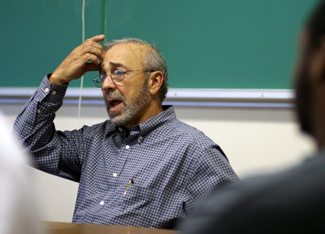Decorated journalist and author Phillip Caputo gave a lecture to a crowded Salter Hall Thursday evening. His lecture, entitled "Fiction is Better Than Truth: Turning Journalism into Art" was the most recent in the Will Hays Jr. Visiting Writer Series.
Veteran Professor of English Tobey Herzog began the introduction by quoting some of the promotional copy about the event produced by the Public Affairs Office. One sentence that he focused on was the line that "like muscle cars and bomber jackets, they don’t make them like Phil Caputo anymore." Herzog then went on to elaborate on that point, discussing more in-depth why his work was so original and why he was chosen for the evening’s presentation. Earlier in the day, Caputo had spent time in Herzog’s classroom.
 And with a career like Caputo’s, there is certainly much to highlight. After serving in the Vietnam War for three years, Caputo returned stateside and began his life as a reporter for The Chicago Tribune. He eventually returned to Vietnam, this time through the eyes of a civilian. It was based on those experiences he wrote Rumor of War, which is widely considered to be among the foremost war memoirs of all time. "All of my writing career I have been both a writer and a journalist," Caputo said, "but they have occupied the same space and time."
And with a career like Caputo’s, there is certainly much to highlight. After serving in the Vietnam War for three years, Caputo returned stateside and began his life as a reporter for The Chicago Tribune. He eventually returned to Vietnam, this time through the eyes of a civilian. It was based on those experiences he wrote Rumor of War, which is widely considered to be among the foremost war memoirs of all time. "All of my writing career I have been both a writer and a journalist," Caputo said, "but they have occupied the same space and time."
It is that composite of talent, being both a journalist and an author, upon which Caputo spent most of his lecture. He mentioned even during his writing, which included elements of fiction, he always maintained a "high standard of professional ethics." He admitted his writing was always influenced by his journalistic training. Indeed, he described his novels as having been grown "out of soil nourished by journalism."
One element that links much of Caputo’s career together is his interest in human nature. "Throughout my writing career," Caputo admitted, "I’ve been fascinated by what happens to people when they are caught up in morally ambiguous situations that test the convictions. Situations like wars where the restraints of civilization are loosened or severed altogether."
He paused for a moment and then continued purposefully, "In such conditions, the soul is laid bare and one discovers what one is made of."
Throughout the course of the lecture, as Caputo related anecdote after anecdote from his long career, the eyes of audience members began to droop and they were transported out of Crawfordsville and into the rebel camps in Sudan or the Vietnamese jungle. Deftly, Caputo weaved his stories into existence while the audience sat quiet, straining to catch every word.
During the question and answer period, one audience member asked whether Caputo’s Catholic upbringing had had any impact on his worldview. Caputo, perhaps unsurprisingly, responded with an anecdote. He mentioned he had recently had dinner with the president of Loyola University who described him as having a "Catholic imagination". According to Caputo, the president defined this as a concern with the ancient. Catholicism, like Judaism, has a culture that is rooted in the ancient world, whereas Protestantism was borne out of the Enlightenment and is more focused on the modern age. Caputo conceded that assuming the president was correct, then indeed his perspective may have been affected by his attending Catholic parochial school.
The lecture was well received by the assembled crowd. Jared Graber, a freshmen from Goshen, Indiana, was really moved. "It altered my personal perspective of Phillip Caputo,"
Graber said. "I learned that he was not simply just a ‘war writer’ but an accomplished writer in many different subjects." A budding English major, Graber smiled and shook his head before adding, "He is an incredible intellectual who has left his mark on the literary world and it was an honor to shake his hand."
The Will Hays Jr., Visiting Writer Series was established in 2002 by the Hays family. Visitors are chosen every other year and are selected from among "poets, novelists, nonfiction, writers, journalists and screenwriters" for their "recognized literariness". The series promotes the study of creative writing at Wabash, enhances Wabash’s reputation Wabash’s reputation as an institution promoting the creative arts, and provides opportunities for students, townspeople, and Indiana teachers of English to interact with a variety of distinguished professional writers. The last Visiting Writer was Tayari Jones in 2005. The first speaker in the series came in 2003, award-winning novelist Robert Olen Butler.